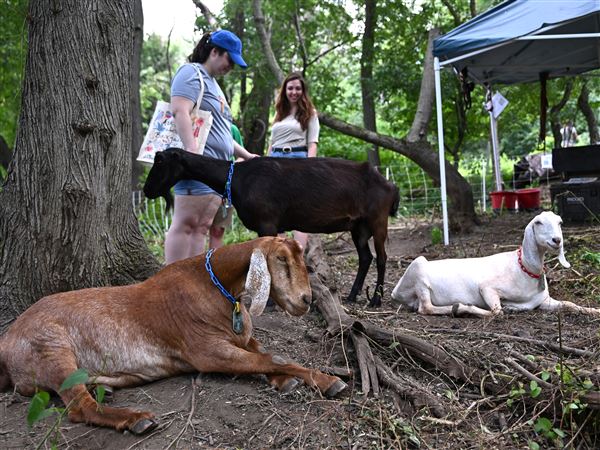Jymm Hoffman does not need to make a name for himself. In blacksmithing circles, he's known. He's gotten awards, taught classes, trained apprentices, published articles.
Hoffman doesn't need the advertising. Above and beyond the constant flow of private orders, he has a large contract to do historically accurate ironwork for Fort Ligonier. His little forge in Ambridge Industrial Park will carry the sounds of clanging metal for the foreseeable future.
There's no title to be earned, no diploma, no "master blacksmith" he can hang from his name. Europe has an organization that hands out such titles, but there's no equivalent in the United States.
And frankly, Hoffman doesn't really have a month to spare. "I've got two years' worth of work to do," he said.

Sparks fly as James "Jymm" Hoffman forge welds a handle for a ladle in his Ambridge forge.
Click photo for larger image.
But he's planning to find a month to spend on a showpiece project anyway, taking a break from candle holders, hinges and soup ladles to build a spit jack, a weight-driven machine of ancient design which is wound by hand, then will turn a spit holding food over a fire.
The machine is related to early clocks, and has intricate machinery and gearing, a huge challenge for a blacksmith working by hand. Hoffman, of Ambridge, got a $5,000 Individual Creative Artist Fellowship grant from the Pennsylvania Council on the Arts for the project.
He will work under the tutelage of Peter Ross, a retired blacksmith from Colonial Williamsburg who worked on a spit jack there.
"For some portions, he will simply have to give me instructions," Hoffman said. "He had time, working at Colonial Williamsburg, to figure this all out. Working at a museum, time's not a big deal."
Time is essential in mastering the craft. Ross has been at it for a lifetime and "I love to just watch him work," Hoffman said.
Hoffman himself has been at it for more than 20 years and can't see ever stopping. "I like coming to work every day," he said. "I like creating things. ... I tell students when I talk to them, 'Sometimes, this stuff can be addictive.'"
Hoffman grew up in Ohio and had his first brush with blacksmithing in 1979, when he volunteered at Ohio Village, a re-created 19th-century town near Columbus.
"I was interested in gunsmithing, and volunteered at the gun shop," Hoffman said. "But the gunsmith was too busy to deal with me, and sent me to the blacksmith shop."
Intrigued, he went to Salem College in West Virginia, one of the few places he could pursue blacksmithing. The school is now Salem-International University and no longer teaches the craft.
He worked as a full-time blacksmith from 1981 to 1988, then used his degree in museum studies to land a job as interpretive programs manager at Old Fort Niagara in Youngstown, N.Y.
Realizing he wanted to be a blacksmith, not a manager, he went back to being a blacksmith full time, blending his skills with his interest in history and museum background to specialize in historic re-enactments. He has period clothing and a traveling forge, and does demonstrations of 18th-century blacksmithing.
Hoffman landed in Ambridge in 1999 because that's where his wife is from. He moved into a small building in the industrial park, intending it as a temporary headquarters until he could build in his back yard.

James "Jymm" Hoffman fashions a hook at the end of a ladle handle in his Ambridge forge on April 21. Hoffman specializes in 18th century reproductions.
Click photo for larger image.
"I was looking for something half this size," he said. "Now I wish I had something twice this size."
Inside the simple brick building is a blend of Hoffman's passion for history with nods to modern convenience. He has a power hammer -- "saves on the elbow," he said -- and a propane forge. "In 1993, when I was in New York, I got fed up looking for good coal," he said.
But he made many of his tools himself, "a very traditional thing for a blacksmith to do," he said, and clops around the forge in traditional wooden shoes.
The shoes come from Holland -- Holland, Mich. -- and Hoffman first got some for his re-enactment work. "But I found I tracked less dirt into the house, and my back and legs aren't as sore." He ended up wearing them every day.
A similar thread runs through the work Hoffman produces. He wants it to be beautiful and authentic, enjoys making it beautiful and authentic. But he also wants it to work.
"I'm not just creating an object to be decorative," he said. "It's an opportunity to make a tool or piece of hardware decorative. It's something that has a function as well as having artistic value."
That's something Hoffman doesn't always see among blacksmiths. Many are happy to do decorative work and let people buy hinges from Lowe's.
Hoffman, though, sees what he does as "living history," and if he's truly going to create that, he needs to work with the same motivations as the old-time blacksmiths.
Function is one of those motivations. There was no Lowe's in Colonial America, and blacksmiths were the source of many everyday items.
Speed and efficiency were another motivation.
"If you want to do true reproductions, you need to not only use the tools and methods, you need to also understand that a blacksmith didn't have three hours to make a hook. He had three minutes," Hoffman said.
"There's a phrase I use with students: 'We're talking about making things. If it ain't hitting the floor, I ain't making money.'
"I don't get paid by the hour; I get paid by the piece," he said, just as Colonial blacksmiths did. "As long as the pace doesn't interfere with the quality, I'm going to try to work the way they did."
Of course, even when finished objects are hitting the floor, it's still not a business anyone would take up for the money.
"I'm just starting to figure out the business part of this," Hoffman said, adding that, despite the backlog of work, he's reluctant to raise his prices. "After 20 years of starving, you're slow to do that. ...
"You don't get into this business to get rich. You do it because you love it."
First Published: May 12, 2005, 4:00 a.m.















